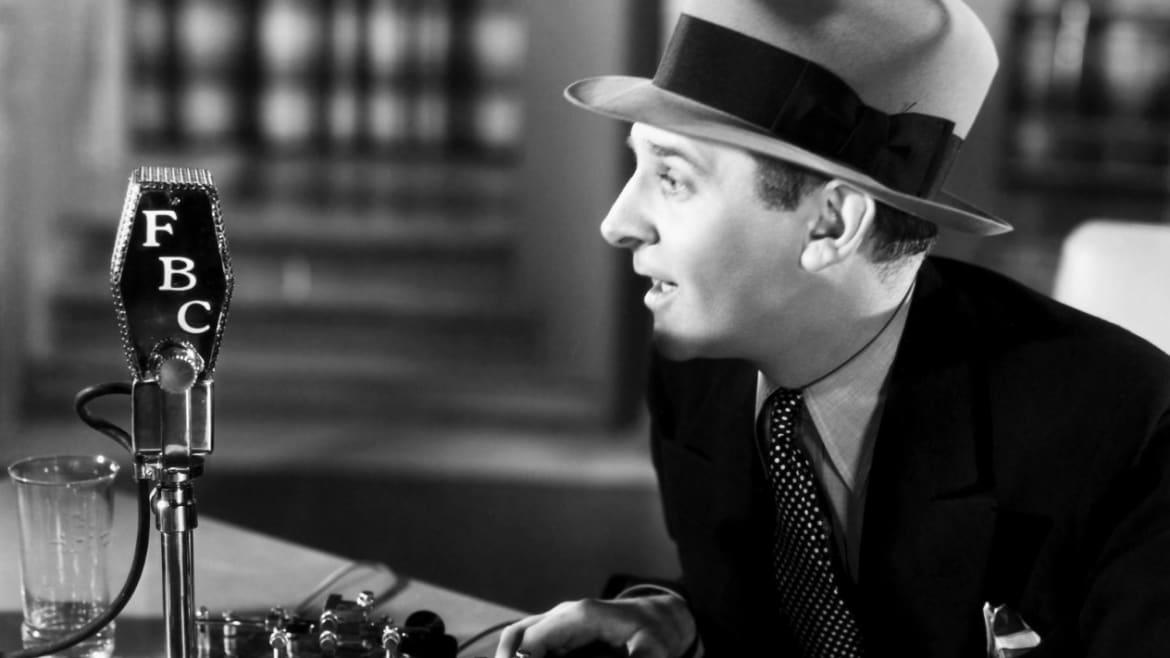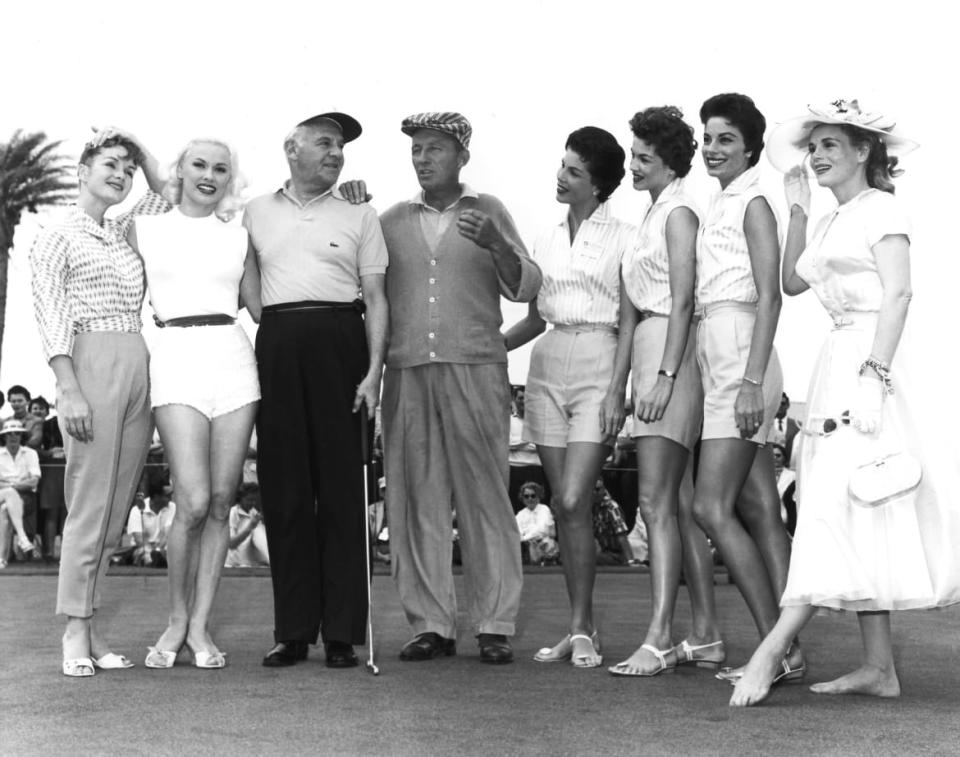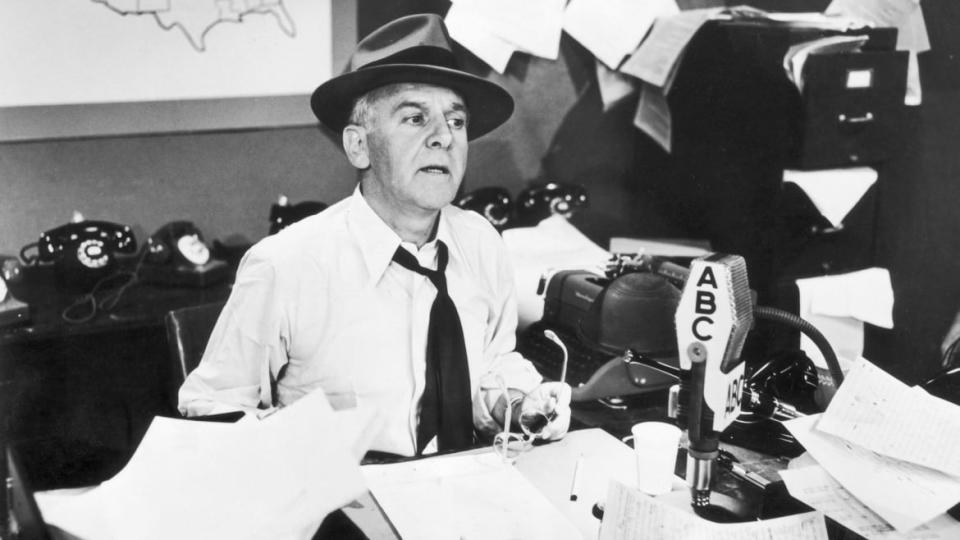Walter Winchell’s Ghost Still Haunts a Media Biz That Divides America

Forty-eight years after his lonely death—and even though millions of people under a certain age in the United States are unaware that he even existed—Walter Winchell continues to exert a formidable influence over the American psyche.
In his remarkably durable heyday from the early 1930s to the mid-1950s—a counterargument to Andy Warhol’s axiom that fame lasts only 15 minutes—Winchell was perhaps the nation’s most popular and powerful celebrity. His daily syndicated newspaper column and weekly radio show enjoyed a combined audience of 50 million; he regularly reached, by one estimate, two out of three American adults.
Walter Winchell: The Power of Gossip, an hourlong documentary airing at 9 p.m. Tuesday (Oct. 20) on PBS stations, explores how he pioneered an unholy fusion of journalism, entertainment and political posturing—call it ideological infotainment—that has become the essential feature and business model of today’s media industry. Thus, the film argues, we can credit Winchell with the template by which Tucker Carlson and Rachel Maddow, John Oliver and Alex Jones, among many others, have managed to insinuate themselves into various lobes of our disconnected national consciousness.
“We live in a polarized moment. We live in alternative fact universes. We are incredibly fractionalized in our media consumption,” the documentary’s director, Ben Loeterman, told The Daily Beast. “But at some point I think Winchell serves as an origin story for that.”

Walter Winchell with, from left to right, Debbie Reynolds; Mamie Van Doren; Bing Crosby; Christine McGuire, Phyllis McGuire and Dorothy McGuire of The McGuire Sisters; and Marie Wilson in 1957.
The film moves at lightning speed through Winchell’s rise and fall. “One of the few things I found to like about Winchell was his pace,” Loeterman said. “I said, I’m not going to empathize with this guy, I really don’t like this guy, but I think we can do him proud on the pacing.”
The son of Russian-Jewish immigrants, he was born poor in Harlem in 1897 and—as voiced in the film by Stanley Tucci (who starred two decades ago in the HBO biopic Winchell)—he lived according to the precept: “I didn’t want to be cold, hungry, homeless—or anonymous.”
For the most part he succeeded, with the notable exception of his final years after he lost his column during the 1963 New York newspaper strike and then lived as a recluse at the Ambassador Hotel in Los Angeles.
The 1957 classic film Sweet Smell of Success—released as Winchell’s career was cratering along with his power—was a thinly veiled demonization of the gossip columnist, portrayed with icy venom by Burt Lancaster. More recently, the late Philip Roth heroized Winchell in his 2004 novel The Plot Against America—adapted for this year’s HBO miniseries—in which a fictional Winchell bravely runs in 1944 against the incumbent president, Hitler appeaser Charles Lindbergh, only to be assassinated by anti-Semites.
Ben Loeterman’s documentary, narrated by Whoopi Goldberg, doesn’t bother to airbrush its subject’s unfortunate traits of loathsomeness. His columns were brazenly homophobic—it seemed the most wounding insult he could come up with for the Fuhrer was that he was “Adele Hitler” and “a fairy.” Winchell was a notorious red-baiter and booster of Wisconsin Sen. Joe McCarthy, parroting the senator’s made-up charges; he flung the epithet “pinko” with abandon. After McCarthy’s downfall, censure by the Senate, and death due to cirrhosis of the liver, Winchell’s association with the commie-hunter proved imprudent and hastened his own professional demise.
When faced with criticism or his vanity was injured—as when Black cabaret star Josephine Baker complained publicly that Winchell, who considered himself a champion of oppressed minorities, didn’t lift a finger to help her when she was denied service at the segregated Stork Club—his retribution was savage: He mercilessly slimed her in his column and didn’t rest until she was forced to cancel her U.S. tour.
Loeterman said Goldberg agreed to narrate the film, an installment in PBS’ American Masters series, in part because the saga of Winchell and Baker was family lore.
One of the few media figures with the cojones to challenge Winchell was, of all people, rival columnist Ed Sullivan, who took Baker’s side. Unlike Winchell—who had a face for radio and came across as “too mean for television,” in the words of a witness—Sullivan hosted a successful variety show for more than two decades on CBS.
Starting at age 12 in 1909, Winchell spent 10 years as a mediocre hoofer and crooner on the vaudeville circuit; married one of his co-stars; dropped her for an ingenue, June Magee, whom he never married, adopted a daughter (who died at age 9 of pneumonia), had two biological children with Magee—a daughter Walda (an aspiring actress whom he involuntarily committed to a psychiatric hospital in order to break up her romance with a sketchy Broadway producer), and a son Walter Jr. (who was packed off to military school as a child, later became a failed journalist, ended up as a dishwasher and died of a self-inflicted gunshot wound at age 33).

Winchell, it seems, was generally a twisted and vindictive human being who neglected his family, choosing to live at New York’s St. Moritz Hotel instead of spending time with his common-law wife and kids at his posh Westchester County estate, “Twelve Acres.” He abused his public platforms to coerce starlets into dating him, sponge off Sherman Billingsley, owner of the Stork Club, for free food and drink, socialize with mobsters, befriend J. Edgar Hoover and Joe McCarthy, and ruin lives. (The documentary is rife with archival footage and still photos of Winchell, a lit cigarette dangling from his lips, fraternizing with celebs and power players such as FBI Director Hoover and his companion Clyde Tolson.)
That said, Winchell was also something of a genius. In 1920, he demonstrated his knack for entertaining readers with juicy tidbits and his innate inventiveness with language (after a formal education that ended with sixth grade) when his then-wife, fellow vaudevillian Rita Green, gave him a typewriter as a present and he immediately started tapping out a gossipy chronicle of his vaudeville troupe, which was pinned to the backstage bulletin board. By 1929, King Features was syndicating Winchell’s column for the New York Daily Mirror, “On-Broadway;” the following year he launched a radio show during which he hailed “Mr. and Mrs. America and all the ships at sea,” and spat out items at a rate of 227 words per minute.
With his gift for “slanguage,” as Winchell called it, he either invented or popularized such terms as “scram,” “G-man,” “pushover,” “making whoopee,” “infanticipate,” “Reno-vated” (for a quickie Nevada divorce), and “Ratzis” and “swastinkas” (for Hitler acolytes).
At the height of the Great Depression, he was earning the equivalent of $10,000 a week—commoditizing the secret foibles of the rich and famous (an unheard-of departure from journalistic decorum) while holding court at the Stork Club’s Table 50, making and breaking showbiz stars—especially the latter with one of his career-killing “scallions,” his equivalent of a poison dart.
“Walter Winchell understood that gossip was a way to take down the mighty and raise up the lowborn,” cultural critic Neal Gabler, author of the definitive Winchell biography, notes in the documentary.
At his zenith, Winchell was earning buckets of greenbacks, mythologized by popular songs and Hollywood movies in which he appeared as himself, and eagerly courted by President Franklin Delano Roosevelt, who craved Winchell’s public support to enter the war against the onslaught of German and Japanese fascism.
At his nadir, Winchell took out a full-page ad in Variety, begging someone, anyone, for a writing job—even offering to sweep the floors.
He “was so sad,” recalled former CNN star Larry King, who had admired Winchell and, when he was offered the space previously occupied by Winchell’s daily column in the Miami Herald, copied his fast-paced style of punchy non sequiturs separated by ellipses. “You know what Winchell was doing at the end?” King said in a 2007 newspaper interview. “Typing out mimeographed sheets with his column, handing them out on the corner.”
Get our top stories in your inbox every day. Sign up now!
Daily Beast Membership: Beast Inside goes deeper on the stories that matter to you. Learn more.

 Yahoo News
Yahoo News 
